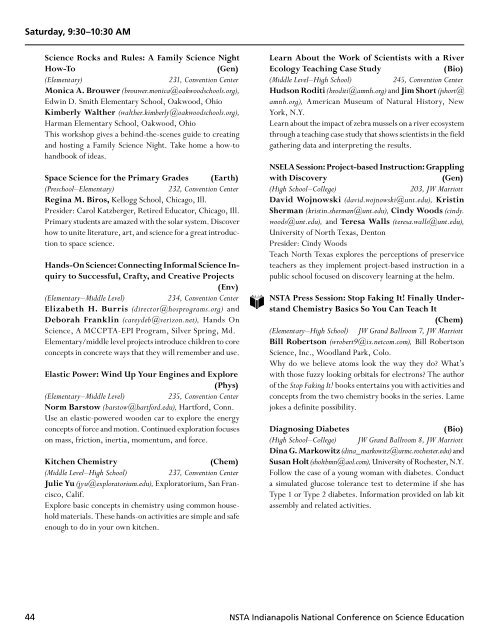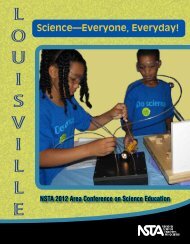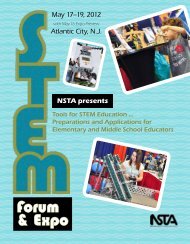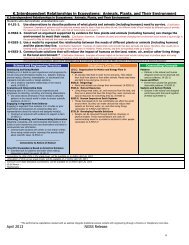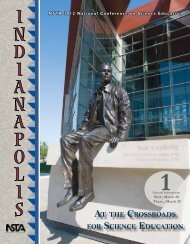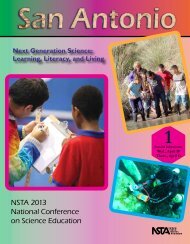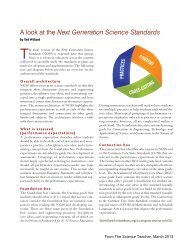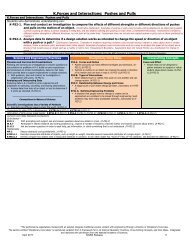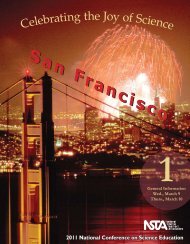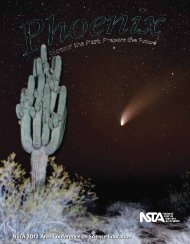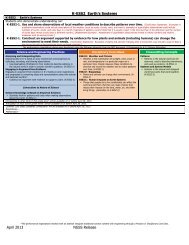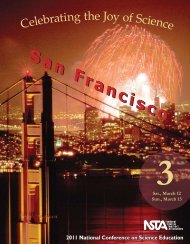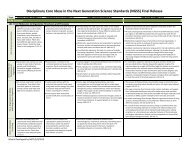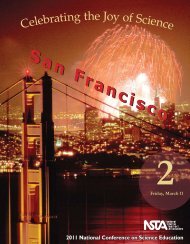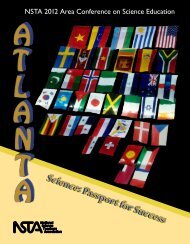Saturday/Sunday
Saturday/Sunday
Saturday/Sunday
Create successful ePaper yourself
Turn your PDF publications into a flip-book with our unique Google optimized e-Paper software.
<strong>Saturday</strong>, 9:30–10:30 AM<br />
Science Rocks and Rules: A Family Science Night<br />
How-To<br />
(Gen)<br />
(Elementary)<br />
231, Convention Center<br />
Monica A. Brouwer (brouwer.monica@oakwoodschools.org),<br />
Edwin D. Smith Elementary School, Oakwood, Ohio<br />
Kimberly Walther (walther.kimberly@oakwoodschools.org),<br />
Harman Elementary School, Oakwood, Ohio<br />
This workshop gives a behind-the-scenes guide to creating<br />
and hosting a Family Science Night. Take home a how-to<br />
handbook of ideas.<br />
Space Science for the Primary Grades (Earth)<br />
(Preschool–Elementary)<br />
232, Convention Center<br />
Regina M. Biros, Kellogg School, Chicago, Ill.<br />
Presider: Carol Katzberger, Retired Educator, Chicago, Ill.<br />
Primary students are amazed with the solar system. Discover<br />
how to unite literature, art, and science for a great introduction<br />
to space science.<br />
Hands-On Science: Connecting Informal Science Inquiry<br />
to Successful, Crafty, and Creative Projects<br />
(Env)<br />
(Elementary–Middle Level)<br />
234, Convention Center<br />
Elizabeth H. Burris (director@hosprograms.org) and<br />
Deborah Franklin (careydeb@verizon.net), Hands On<br />
Science, A MCCPTA-EPI Program, Silver Spring, Md.<br />
Elementary/middle level projects introduce children to core<br />
concepts in concrete ways that they will remember and use.<br />
Elastic Power: Wind Up Your Engines and Explore<br />
(Phys)<br />
(Elementary–Middle Level)<br />
235, Convention Center<br />
Norm Barstow (barstow@hartford.edu), Hartford, Conn.<br />
Use an elastic-powered wooden car to explore the energy<br />
concepts of force and motion. Continued exploration focuses<br />
on mass, friction, inertia, momentum, and force.<br />
Kitchen Chemistry<br />
(Chem)<br />
(Middle Level–High School)<br />
237, Convention Center<br />
Julie Yu (jyu@exploratorium.edu), Exploratorium, San Francisco,<br />
Calif.<br />
Explore basic concepts in chemistry using common household<br />
materials. These hands-on activities are simple and safe<br />
enough to do in your own kitchen.<br />
Learn About the Work of Scientists with a River<br />
Ecology Teaching Case Study<br />
(Bio)<br />
(Middle Level–High School)<br />
245, Convention Center<br />
Hudson Roditi (hroditi@amnh.org) and Jim Short (jshort@<br />
amnh.org), American Museum of Natural History, New<br />
York, N.Y.<br />
Learn about the impact of zebra mussels on a river ecosystem<br />
through a teaching case study that shows scientists in the field<br />
gathering data and interpreting the results.<br />
NSELA Session: Project-based Instruction: Grappling<br />
with Discovery<br />
(Gen)<br />
(High School–College)<br />
203, JW Marriott<br />
David Wojnowski (david.wojnowski@unt.edu), Kristin<br />
Sherman (kristin.sherman@unt.edu), Cindy Woods (cindy.<br />
woods@unt.edu), and Teresa Walls (teresa.walls@unt.edu),<br />
University of North Texas, Denton<br />
Presider: Cindy Woods<br />
Teach North Texas explores the perceptions of preservice<br />
teachers as they implement project-based instruction in a<br />
public school focused on discovery learning at the helm.<br />
NSTA Press Session: Stop Faking It! Finally Understand<br />
Chemistry Basics So You Can Teach It<br />
(Chem)<br />
(Elementary–High School) JW Grand Ballroom 7, JW Marriott<br />
Bill Robertson (wrobert9@ix.netcom.com), Bill Robertson<br />
Science, Inc., Woodland Park, Colo.<br />
Why do we believe atoms look the way they do What’s<br />
with those fuzzy looking orbitals for electrons The author<br />
of the Stop Faking It! books entertains you with activities and<br />
concepts from the two chemistry books in the series. Lame<br />
jokes a definite possibility.<br />
Diagnosing Diabetes<br />
(Bio)<br />
(High School–College) JW Grand Ballroom 8, JW Marriott<br />
Dina G. Markowitz (dina_markowitz@urmc.rochester.edu) and<br />
Susan Holt (sholtbmn@aol.com), University of Rochester, N.Y.<br />
Follow the case of a young woman with diabetes. Conduct<br />
a simulated glucose tolerance test to determine if she has<br />
Type 1 or Type 2 diabetes. Information provided on lab kit<br />
assembly and related activities.<br />
44 NSTA Indianapolis National Conference on Science Education


